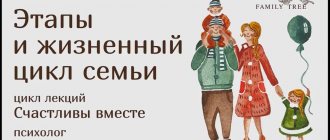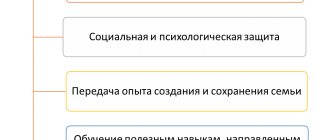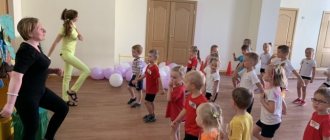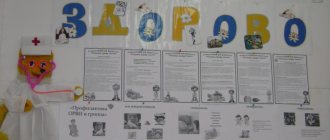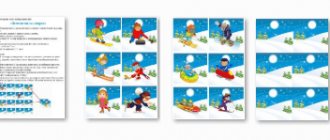Traditional forms of interaction
Traditional forms of interaction between preschool educational institutions and parents include:
- A visit to the child’s family is aimed at studying the living conditions and upbringing of the child, directly at the family’s place of residence. The visit is agreed in advance with the parents and the head, the purpose and time of the teacher’s visit is determined. During the visit, the teacher notes the conditions in which the child lives, the financial situation of the family and its social status, who is directly involved in raising children in the family, etc.
- Visual propaganda is carried out through the use of various types of visuals, which helps the teacher not only answer parents’ questions about the upbringing and development of children, but also show the course of the educational process, the methods, means and techniques of education used. For this purpose, teachers prepare stands, mobile folders, booklets, etc.
- Open Day is the most common form of work with a pupil’s family; parents are given the opportunity to get acquainted with the activities of the preschool educational institution, its traditions, rules and features of the organization of the pedagogical process.
- Conversations are conducted individually and in groups. Each conversation has a clear purpose, content and conclusions. The purpose of the conversation is aimed at clarifying difficulties in upbringing, the content should be concise and understandable to parents, the conclusions help to clearly see the work done. During the conversation, the teacher’s task is not only to speak, but also to listen to parents.
- Consultations are conducted by a teacher for a group of parents or individually. Group consultations are carried out for a group of parents who have similar problems in upbringing, individually on specific issues relating to a particular child. The purpose of consultations is to provide parents with the necessary advisory assistance in resolving problematic issues.
- Parent conferences are aimed at exchanging experiences on family education issues. Each parent who wishes to take part in the conference prepares a report of a few minutes on a specific topic in advance, which he presents directly at the conference. In addition to parents and educators, an invited specialist (speech therapist, psychologist, speech pathologist) and the head of the preschool educational institution can also take part in the conference. Conferences can be held either within the framework of one preschool educational institution, or large-scale ones, including several institutions located in the same district.
Note 2
Forms of interaction between preschool educational institutions and parents must constantly change. The most common traditional forms of work are conversations and consultations. This is due to the fact that they are easy to organize, cover a large number of parents, and allow you to discuss issues both collectively and personally.
“Effective technologies for cooperation between preschool educational institutions and parents”
Shchegoleva T.V., teacher
GBDOU kindergarten No. 33 compensatory type
Primorsky district of St. Petersburg
“Effective technologies for cooperation between preschool educational institutions and parents”
Technologies for effective interaction between kindergarten and family.
The main thing in the work of any preschool educational institution is to preserve and strengthen the physical and mental health of pupils, their creative and intellectual development, and provide conditions for personal growth. The successful implementation of this large and responsible work is impossible in isolation from the family, because parents are THE FIRST AND MAIN EDUCATORS OF THEIR CHILD FROM THE MOMENT OF BIRTH AND FOR THE WHOLE LIFE.
With the adoption of the Law of the Russian Federation “On Education”, prerequisites arose for equal, creative, interested interaction between family and educational institutions (Article 18 of the Law of the Russian Federation “On Education”).
Parents need to remember that kindergarten is only an assistant in raising a child, so they should not shift all responsibility to the kindergarten or eliminate themselves, taking the position of consumers of educational services. At the same time, practice shows that many parents do not have special knowledge in the field of education, do not know the age-related characteristics of development, do not take into account the individual characteristics and capabilities of the child, experience certain difficulties in establishing contacts with children, and often carry out education blindly and intuitively.
Family and kindergarten are two social institutions that stand at the origins of our future, but often they do not always have enough mutual understanding, tact, and patience to hear and understand each other. The misunderstanding between the family and the kindergarten falls heavily on the child.
What does the concept of “interaction” include?
Most scientists characterize interaction as a mechanism of interpersonal communication between participants in the pedagogical process; other researchers focus on the social nature of the connection between the individual and the community (the immediate and distant environment).
In the pedagogical literature, interaction is interpreted as “a special form of communication between participants in the pedagogical process, which provides for the mutual enrichment of the intellectual, emotional, and activity spheres of the participants, their coordination and harmonization, personal contact, resulting in mutual changes in their behavior, activities, relationships, and attitudes.”
How can teachers involve parents in pedagogical interaction with the child, maintain confidence in their own pedagogical capabilities, while moving away from overorganization and boring templates, and work with parents in an interesting way, taking into account new forms of interaction, creating in kindergarten an atmosphere of creative communication, mutual understanding and support. The activities of parents and teachers can only be successful if they become allies, which will allow them to get to know the child better, see him in different situations, develop his abilities and form value guidelines in life, and prevent negative actions and behavior.
In order to be a true promoter of the means and methods of preschool education, a kindergarten in its work must serve as a model of such education. Only under this condition will parents trust the teachers’ recommendations and be willing to establish contact with them.
Principles of interaction between teacher and parents:
- Focused, systematic, planned.
- A friendly communication style that is collaborative rather than mentoring.
- An individual, differentiated approach to work, taking into account the specifics of each family.
- Dynamism.
Family study methods:
- Parent survey.
- Individual conversations with parents, studying family requests.
- Child monitoring.
- Individual conversations with children.
- Family examination using projective techniques.
- Visiting the families of pupils.
- Study of children's drawing tests such as “My house”, “My family”.
- Observation of a child in the role-playing game “Family”.
- Observations by the teacher of the relationship between parents and children during the admission of children to kindergarten and the children’s departure home.”
Forms of work with families: general, group, individual.
Traditional forms and methods of working with parents:
—
Visual propaganda: design of information stands, booklets, mobile folders, exhibitions of children's works.
— Visiting the families of pupils.
— Parent meetings.
— Conversations, consultations, conferences, round table meetings.
— Questionnaires on various issues.
— Open days: viewing of regime moments, NOOD, matinees.
— Participation of parents in public events of the kindergarten, exhibitions, competitions.
— Organization of the work of the parent committee of the group, kindergarten.
Open days give parents the opportunity to observe their children in a situation other than family. They can compare the child’s behavior in the family and in kindergarten, and adopt teaching methods and educational influences from the teacher.
Non-traditional (new) forms of work of preschool teachers with parents:
— Creation of family projects: “Our friendly family”, “Family coats of arms and pedigrees”, “Little discoveries in my big family”, “Family workshop”.
— Weekend project: “Nature Scouts”, “Weekend Hike”.
— Thematic mini-projects.
— Participation of parents in creative competitions.
— Interest clubs.
— Organizing a library for parents.
— Issue of the newspaper “Veselaya Semeyka”.
— Modeling and solving pedagogical situations.
The use of ICT is one of the modern methods of working with parents. Today, electronic day-care is widely used in educational institutions across the country. In preschool educational institutions such forms of interaction as a garden website and groups have appeared. On which information about the kindergarten, group, presentation of the kindergarten, photo album “Let's get acquainted” is posted.
Bibliography:
1. Interaction between preschool educational institutions and families./ Compiled by O.I. Bochkareva.- Volgograd: ITD “Corypheus”. -112s.
2. Interaction between family and preschool educational institution: programs for the development of parent-child relationships; joint activities of teachers, parents and children / author-comp. ON THE. Kochetova, I.A. Zheltikova, M.A. Tveretina. – Volgograd: Teacher, 2014. -218 p.
4. Kochkina N.A. Project method in preschool education: Methodological manual. – M.: MOSAIC-SYNTHESIS, 2012.-72 p.
5. Osipova L.E. Kindergarten work with families. – M.: “Publishing house Scriptorium 2003”, 2011. – 72 p.
